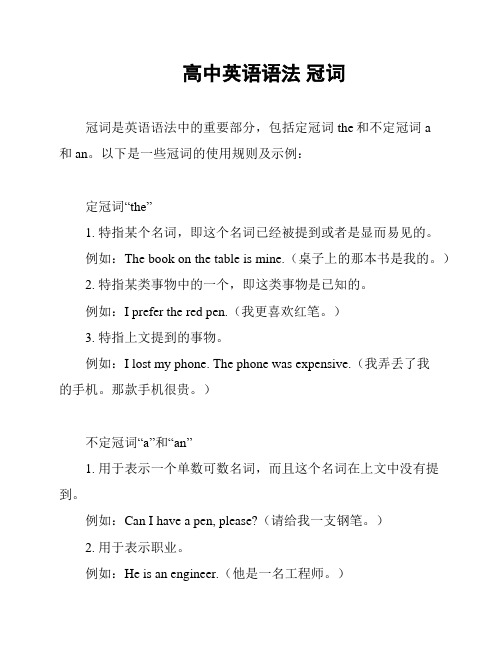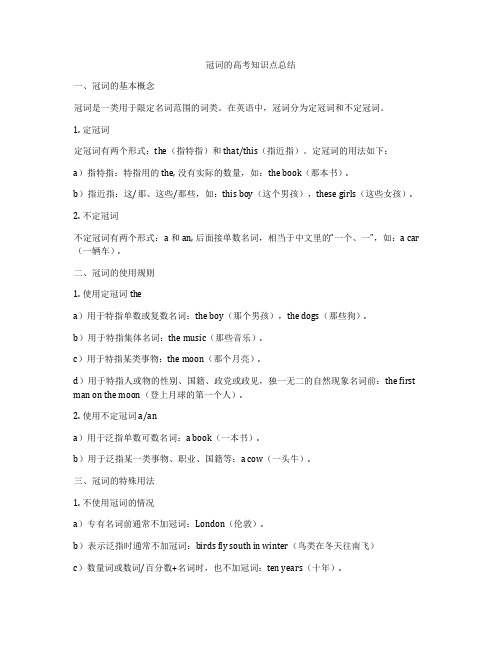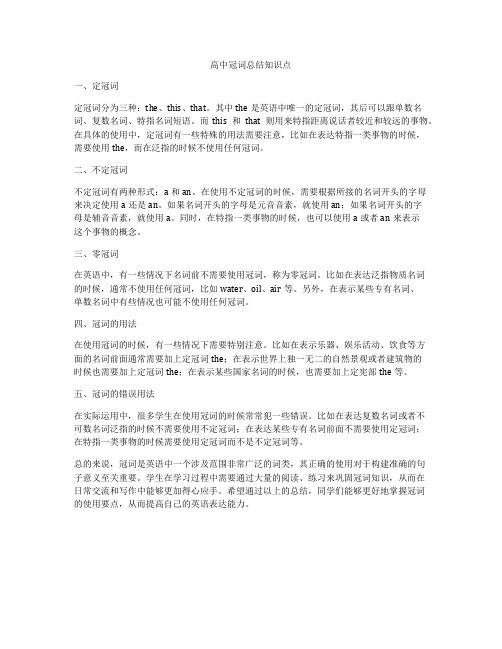高中英语基础语法复习十七:冠词
冠词总结知识点归纳高中

冠词总结知识点归纳高中一、冠词的基本概念1. 冠词的定义冠词是一种语法范畴,用来表示名词的特指程度和表达名词的数量。
英语中的冠词主要分为定冠词和不定冠词两种。
定冠词包括“the”,不定冠词包括“a”和“an”。
2. 冠词的分类(1)定冠词:the(2)不定冠词:a,an二、定冠词的用法1. 特指一类事物“the”用于特指一类事物或某一人,表示上下文中所指的人或物。
2. 特指具体的事物“the”还可以用来指示上下文中已经具体说明或者双方都知道的人或物。
3. 特指独一无二的事物用于特指那些在特定范围中独一无二的事物,如太阳、月亮、地球等。
4. 特指自然界中的某一事物用于特指自然界中的某一事物,如天空、太阳等。
5. 特指宇宙中的某一事物用于特指宇宙中的某一事物,如“the sun”(太阳)、“the moon”(月亮)等。
6. 特指某一时间点用于特指某一时间点,如“the morning”(早上)、“the afternoon”(下午)等。
7. 特指某一地点用于特指某一地点,如“the school”(学校)、“the hospital”(医院)等。
三、不定冠词的用法1. 表示数量,修饰单数名词“a”和“an”用于表示数量的不确定性,修饰单数名词。
2. 泛指一类事物“a”和“an”还可以用于泛指一类事物,表示任何一个、一种、一些。
3. 表示重复出现的动作用于表示重复出现的动作,如“once a week”(一周一次)、“twice a month”(一个月两次)等。
四、特殊情况下的冠词用法1. 特指两者中的一个在表示两者中的一个时,用“the”表示特指。
2. 特指某个人的职业或身份当表示某个人的职业或身份时,也需要使用“the”。
3. 修饰序数词在修饰序数词时,需要使用“the”,如“I am the first one to arrive”(我是第一个到达的人)。
4. 表示特定类别的人群用于表示特定类别的人群时,需要使用“the”,如“the rich”(富人)、“the poor”(贫困者)等。
高中英语知识点归纳冠词的使用规则

高中英语知识点归纳冠词的使用规则高中英语中,冠词是一个重要的语法点,对于学生来说掌握冠词的使用规则是十分必要的。
本文将对冠词的使用规则进行归纳总结,帮助学生更好地理解和运用冠词。
一、冠词的概念和分类冠词是英语中的一类虚词,用于限定名词的范围。
冠词分为两种:定冠词(definite article)和不定冠词(indefinite article)。
- 定冠词:指具体已知或特指的事物,包括"the"。
- 不定冠词:指泛指或不具体的事物,包括"a"和"an"。
二、冠词的用法1. 定冠词的用法(1)特指某一事物或人物。
如:The book on the table is mine.(2)特指已提及的事物或人物。
如:I bought a book. The book is very interesting.(3)指世界上独一无二的事物或人物。
如:He is the president of the United States.(4)特指领域里的事物或人物。
如:I am interested in the history of the United States.(5)特指序数词、形容词最高级、领头词或短语的第一个词。
如:This is the first time I've been to China.2. 不定冠词的用法(1)泛指某一事物或人物。
如:I want to buy a book.(2)指职业、宗教、国籍、语言、性别等身份。
如:She is an engineer.(3)表示倍数或比例。
如:It's three times a week.三、冠词的特殊情况1. 用于一些特定名词前。
(1)表示一顿饭的名词前。
如:I had breakfast at 7 o'clock.(2)表示医院、监狱、学校等名词前。
如:He was in the hospital last week.(3)表示年份、月份、星期、季节等名词前。
冠词知识点总结简短高中

冠词知识点总结简短高中冠词是一个在英语语法中非常重要的部分。
在英语中有三种冠词:定冠词“the”和不定冠词“a”和“an”。
冠词的作用是用来限定名词的范围,使得名词在句子中有更加清晰的指代作用。
在使用冠词时,需要根据名词的性质和上下文来进行选择。
以下是一些关于冠词的知识点总结:1. 定冠词“the”:定冠词“the”用来指示特定的事物或人,一般而言是在双方都知道的情况下使用。
例如:“the car over there”、“the book on the table”。
同时,“the”也可以用来指示某一类事物或人,例如:“the sun is hot”、“the tiger is a dangerous animal”。
2. 不定冠词“a”和“an”:不定冠词“a”和“an”用来指代单数可数名词,并且一般用在第一次提及某个事物或人的时候。
此外,“a”用在辅音音素前,“an”用在元音音素前。
例如:“a book”、“an apple”。
3. 名词前不用冠词的情况:有些情况下,名词前面是不需要冠词的。
例如:“He goes to school”、“She is a student”。
4. 冠词的用法取决于名词的性质:冠词的使用需要根据名词的性质来进行选择。
例如,具体的名词通常需要用定冠词“the”,而泛指的名词则需要用不定冠词“a”或“an”。
5. 冠词的使用受上下文的影响:在一些情况下,冠词的使用会受到上下文的影响。
例如,在一个连续发生的事件中,第一次提及一个事物或人时使用不定冠词,以后的提及则可以使用定冠词。
总之,冠词在英语语法中扮演着非常重要的角色。
正确地使用冠词可以提高句子的准确性和连贯性。
因此,学习者应该认真学习冠词的用法,并在实践中不断加强对冠词的理解和运用。
高中英语语法 冠词

高中英语语法冠词
冠词是英语语法中的重要部分,包括定冠词the和不定冠词a
和an。
以下是一些冠词的使用规则及示例:
定冠词“the”
1. 特指某个名词,即这个名词已经被提到或者是显而易见的。
例如:The book on the table is mine.(桌子上的那本书是我的。
)
2. 特指某类事物中的一个,即这类事物是已知的。
例如:I prefer the red pen.(我更喜欢红笔。
)
3. 特指上文提到的事物。
例如:I lost my phone. The phone was expensive.(我弄丢了我
的手机。
那款手机很贵。
)
不定冠词“a”和“an”
1. 用于表示一个单数可数名词,而且这个名词在上文中没有提到。
例如:Can I have a pen, please?(请给我一支钢笔。
)
2. 用于表示职业。
例如:He is an engineer.(他是一名工程师。
)
3. 用于表示国籍、宗教、政治或家族成员。
例如:He is a Chinese.(他是中国人。
)
需要注意的是,有些单数可数名词的开头因其音素而不同:以元音音素开头的名词用不定冠词“an”,以辅音音素开头的名词用不定冠词“a”。
例如:an hour, a book.
此外,冠词还有一些特殊用法,对于研究英语的人来说意义重大,需要在研究过程中加以注意和掌握。
总之,冠词在英语语法中具有重要的作用,掌握冠词的用法能够更加准确、规范地表达自己的意思。
高中英语知识点归纳冠词的用法总结

高中英语知识点归纳冠词的用法总结冠词是英语中非常重要的一部分,其正确使用不仅能够使语言更加准确地表达,还能够影响语义的差异。
在高中英语学习中,掌握冠词的用法对于学生们来说至关重要。
下面是对冠词的用法进行归纳总结:一、冠词的基本概念冠词(Articles)是英语词性的一种,用于修饰名词,起限定名词作用。
在英语中,冠词分为三种:定冠词(the)、不定冠词(a/an)和零冠词。
定冠词用于特指已知事物,不定冠词用于泛指或表示一类事物,而零冠词表示无冠词的情况。
二、定冠词的用法1. 特指已知事物:The teacher is speaking.(这位老师正在讲话。
)2. 特指独一无二的事物:The sun rises in the east.(太阳从东方升起。
)3. 特指前文提到过的事物:I have a cat. The cat is very cute.(我有一只猫。
那只猫非常可爱。
)4. 特指某类人或事物中的某个具体事物:The car is a wonderful invention.(汽车是一个非常棒的发明。
)三、不定冠词的用法1. 用于泛指或表示一类事物:I need a pen.(我需要一支钢笔。
)2. 在以元音音素开头的词前使用an,其他情况下使用a:an apple(一个苹果),a book(一本书)四、零冠词的用法1. 用于表示泛指或表示一般概念:Dogs are loyal animals.(狗是忠诚的动物。
)2. 用于表示职务、身份、名称等特指事物时:She is president of the company.(她是公司的总裁。
)五、特殊用法1. 在序数词、形容词最高级和单数名词前使用定冠词the:He is the first student to arrive.(他是第一个到达的学生。
)She is the tallest girl in our class.(她是我们班最高的女孩。
冠词总结知识点归纳

冠词总结知识点归纳一、冠词的定义冠词是指定名词词义的虚词。
它位于名词之前,有时在其前面可以有形容词或其他修饰词。
冠词的使用是语言中一个非常基本的语法规则,是学习英语的重要一环。
在英语语法中,冠词分为三种:不定冠词a/an,定冠词the和零冠词。
二、不定冠词1. 不定冠词的定义不定冠词有两个形式,即a和an,表示泛指或不特定的人或事物。
a用于辅音开头的词前,an用于元音开头的词前。
2. 不定冠词的使用(1)用在可数名词的单数形式前,泛指一个人或事物。
例:I saw a dog in the street.(2)表示职业、国籍、宗教或宗教信仰的一个人。
例:He is a doctor.(3)表示一种特殊的人或事物。
例:She lived in a small house.3. 注意事项(1)不定冠词的a变成an时,只是音标的问题,而不是词的本身。
(2)a和an本身没有复数形式,也没有限定词的概念。
三、定冠词1. 定冠词的定义定冠词the有三种形式,即普通形式the,音标为[ðə];元音开头名词前的形式the,音标为[ði:];辅音开头连读时的形式the,音标为[ðə]。
定冠词the表示特指,用于特定的人或事物。
2. 定冠词的使用(1)用在特指的可数名词或不可数名词前,表示特定的人或事物。
例:The boy is playing in the garden.(2)用于上文已经提到过的名词前,表示特指。
例:She opened the door and went out.3. 注意事项(1)the没有复数形式,也没有限定词的概念。
(2)the不同于a或an,the并不表示非常特指。
四、零冠词1. 零冠词的定义零冠词指的是没有冠词的情况,即名词前没有任何限定词。
这种情况并不表示名词没有冠词,只是在语法上的规定。
2. 零冠词的使用(1)通常用于不可数名词或复数名词前。
例:She has long hair.(2)用于专有名词前,比如人名、地名、国名等。
冠词的高考知识点总结

冠词的高考知识点总结一、冠词的基本概念冠词是一类用于限定名词范围的词类。
在英语中,冠词分为定冠词和不定冠词。
1. 定冠词定冠词有两个形式:the(指特指)和that/this(指近指)。
定冠词的用法如下:a)指特指:特指用的the, 没有实际的数量,如:the book(那本书).b)指近指:这/那、这些/那些,如:this boy(这个男孩),these girls(这些女孩).2. 不定冠词不定冠词有两个形式:a和an, 后面接单数名词,相当于中文里的“一个、一”,如:a car (一辆车).二、冠词的使用规则1. 使用定冠词thea)用于特指单数或复数名词:the boy(那个男孩),the dogs(那些狗).b)用于特指集体名词:the music(那些音乐).c)用于特指某类事物:the moon(那个月亮).d)用于特指人或物的性别、国籍、政党或政见,独一无二的自然现象名词前:the first man on the moon(登上月球的第一个人).2. 使用不定冠词a/ana)用于泛指单数可数名词:a book(一本书).b)用于泛指某一类事物、职业、国籍等:a cow(一头牛).三、冠词的特殊用法1. 不使用冠词的情况a)专有名词前通常不加冠词:London(伦敦).b)表示泛指时通常不加冠词:birds fly south in winter(鸟类在冬天往南飞)c)数量词或数词/百分数+名词时,也不加冠词:ten years(十年).2. 冠词的连用a)形容词性物主代词+冠词+名词:my sister's the book(我姐姐的那本书).b)数词+冠词+名词:two the boys(那两个男孩).3. 冠词和其他介词的连用a)表示特指的地点名词前通常不用冠词:in China, in class.b)不定冠词与表示运动方向的词连用:take a walk, have a look.四、高考常见考点1. 冠词的选择在高考中,经常会涉及到冠词的选择,例如考生需要根据上下文的语境来决定使用不定冠词还是定冠词,这就需要考生对冠词的用法有相当的敏感度。
高中冠词总结知识点

高中冠词总结知识点一、定冠词定冠词分为三种:the、this、that。
其中the是英语中唯一的定冠词,其后可以跟单数名词、复数名词、特指名词短语。
而this和that则用来特指距离说话者较近和较远的事物。
在具体的使用中,定冠词有一些特殊的用法需要注意,比如在表达特指一类事物的时候,需要使用the,而在泛指的时候不使用任何冠词。
二、不定冠词不定冠词有两种形式:a和an。
在使用不定冠词的时候,需要根据所接的名词开头的字母来决定使用a还是an。
如果名词开头的字母是元音音素,就使用an;如果名词开头的字母是辅音音素,就使用a。
同时,在特指一类事物的时候,也可以使用a或者an来表示这个事物的概念。
三、零冠词在英语中,有一些情况下名词前不需要使用冠词,称为零冠词。
比如在表达泛指物质名词的时候,通常不使用任何冠词,比如water、oil、air等。
另外,在表示某些专有名词、单数名词中有些情况也可能不使用任何冠词。
四、冠词的用法在使用冠词的时候,有一些情况下需要特别注意。
比如在表示乐器、娱乐活动、饮食等方面的名词前面通常需要加上定冠词the;在表示世界上独一无二的自然景观或者建筑物的时候也需要加上定冠词the;在表示某些国家名词的时候,也需要加上定宪部the等。
五、冠词的错误用法在实际运用中,很多学生在使用冠词的时候常常犯一些错误。
比如在表达复数名词或者不可数名词泛指的时候不需要使用不定冠词;在表达某些专有名词前面不需要使用定冠词;在特指一类事物的时候需要使用定冠词而不是不定冠词等。
总的来说,冠词是英语中一个涉及范围非常广泛的词类,其正确的使用对于构建准确的句子意义至关重要。
学生在学习过程中需要通过大量的阅读、练习来巩固冠词知识,从而在日常交流和写作中能够更加得心应手。
希望通过以上的总结,同学们能够更好地掌握冠词的使用要点,从而提高自己的英语表达能力。
- 1、下载文档前请自行甄别文档内容的完整性,平台不提供额外的编辑、内容补充、找答案等附加服务。
- 2、"仅部分预览"的文档,不可在线预览部分如存在完整性等问题,可反馈申请退款(可完整预览的文档不适用该条件!)。
- 3、如文档侵犯您的权益,请联系客服反馈,我们会尽快为您处理(人工客服工作时间:9:00-18:30)。
语法复习十七:冠词(一)考纲要求考纲规定,冠词考查基本用法,包括定冠词与不定冠词,不定冠词a与an的区别;不用冠词的情况;习语中的冠词;特指与泛指等。
(二)命题导向冠词规则的灵活运用是高考命题的一个热点,几乎每年高考题的单项选择或完形填空都有涉及冠词的题目,不定冠词和定冠词的一些特殊用法,习惯用法及不用冠词的情况是高考重点考查的知识点。
(三)基本用法当代语法把冠词分为不定冠词、定冠词和零冠词(即不用冠词)三种。
冠词是一种虚词,起限定作用,是最主要最典型的限定词,放在名词(或名词化的形容词分词)前面,说明其所指的人或物。
1、定冠词的基本用法:①表示上文提到过的人或事物。
如:I have bought a book. The book is very useful.②用于说话人与听话人心中都有数的人或事物。
如:Close the window, please.③用于表示世界上独一无二的事物前。
如:the sun, the moon, the earth, the world等。
④用于表示方位的名词之前。
如:the east, the right.⑤用于序数词或形容词的最高级之前。
如:the first, the tallest.⑥用于形容词之前,使其名词化。
如:the sick, the wounded.⑦用于由普通名词构成的专有名词之前。
如:the United States, the United Nation.⑧用于江河、海洋、海峡、山脉、群岛、建筑物等的名词之前。
如:the Changjiang River, the East Lake.⑨用于复数姓氏之前,表示“夫妇”或“全家”。
如:The Smiths⑩用于乐器的名词前。
如:play the piano; play the violin.⑾发明物。
如:The compass was invented in China.⑿年代名词前。
如:He lived in the countryside in the 1970s.⒀固定词组中。
如:in the morning(afternoon, evening), on the other hand , at the same time2、不定冠词的基本用法:①泛指一个。
如:There is a book on the table.②指人或事物的某一种类。
如:His father is a driver. Longjing is a wonderful tea.③指某一个人或事物,但不具体说明。
如:My sister was saved by a PLA man in the fire.④用于某一些表示重量、长度、时间等单位前,表示“每一”。
如:We have meals three timesa day.(我们一天吃三餐。
)⑤表示同样的。
如:They are of an age.(他们是同岁。
)⑥表数量,相当于one,但语意较弱。
如:There is a pen and two books on the desk.⑦使抽象名词具体化。
如:The little girl is a help to her mother. (a hand译"帮手")⑧固定搭配。
如:as a matter of fact , in a hurry, in a word3、不用冠词的情况:①表示总称的复数名词之前。
如:Children love cartoons.(儿童喜欢卡通影片。
)②不含普通名词的专有名词前。
如:We are studying English.③名词前有指示代词、物主代词、不定代词或名词所有格修饰时。
如:I like this picture; I do not have any money; As time went on, Einstein’s theory proved to be correct.④季节、月份、星期等名词前,一般不用冠词。
如:She likes spring most.⑤呼语前不用冠词。
如:What shall I do next, Mother?⑥三餐饭前不用冠词。
如:What did you have for lunch?⑦节假日前不用冠词。
如:People give gifts to each other on Christmas Day.⑧球类和棋类运动的名称前不用冠词。
如:She is fond of playing basketball.⑨在一些成对出现的短语中不用冠词。
如:arm in arm(手挽手); hand in hand(手牵手); side by side(肩对肩); day and day(日日夜夜); young and old(老老少少); from door to door107(挨门挨户); from beginning to end(从头到尾); from morning till night(从早到晚)等。
练习(一)、冠词1. In America, ____ car is ____ popular means of transportation(交通设施).A. the, theB. a, theC. the, /D. the, a2. ---- What happened? ---- They left in such ____ hurry that they forgot to lock ____ door.A. a, aB. a, theC. /, theD. /, a3. There were two small rooms in the house, ____ smaller of which served as ____ kitchen.A. a, theB. the, aC. the, theD. a, a4. I ordered ____ book some time ago. ____ book has arrived.A. a, TheB. the, AC. a, AD. /, The5. Mr Smith is ____ European and his wife is ____ American.A. an, anB. a, aC. a, anD. an, a6. Lesson 10 is ____ most difficult lesson, but it isn’t ____ most difficult lesson in Book One.A. a, aB. a, theC. the, theD. the, a7. My sister works in a factory. She goes home once ____ month. A. a B. an C. the D. every8. He was absent because he had caught ____.A. heavy a coldB. the heavy coldC. a heavy coldD. heavy cold9. ____ water is ____ liquid. A. The, a B. A, a C. /, / D. /, a10. In winter ____ people often hang up wet clothes near ____ fire.A. /, /B. a, aC. /, aD. the, a11. He has tried twice, and the captain asks him to have ____ third try.A. aB. theC. anotherD. other12. He was a top student in the class, he often got ____ in English.A. firstB. a firstC. secondD. the second13. ____ horse is ____ useful animal. A. The, the B. The, a C. The, an D. /, a14. Tom left Shanghai in ____.A. the summer 1995B. summer 1995C. 1995 the summerD. the summer of 199515. ____ children here live ____ most happy life. A. The, the B. The, a C. The, / D. /, the16. The soldier died during ____ World War I. A. the B. the first C. / D. a17. In ____ Marx began to learn Russian.A. a 1870B. 1870sC. the year of 1870D. the 1870s18. Alice is ____ of the two girls. A. taller B. the tall C. more tall D. the taller19. ---- Can your sister play ____? ---- No, but she can play ____.A. the tennis, the pianoB. tennis, pianoC. the tennis, pianoD. tennis, the piano20. The introduction is always in ____ of a book.A. frontB. the frontC. a frontD. instead21. She touched her daughter gently ____ shoulder.A. in herB. on herC. in theD. on the22. Both ____ wounded and ____ sick were sent to safety.A. /, /B. the, theC. /, theD. the, /23. ____ doctors and ____ nurses should care for their patients.A. The, theB. /, /C. The, /D. /, the24. Tell us the story as ____ Mother told you. A. a B. the C. an D. /25. Do you know how long ____ has lived on the earth?A. manB. the manC. a manD. men26. The man was once thrown into ____ prison for robbing the bank. A. a B. an C. the D./10827. ____ Mount Tai is in the east of China. A. A B. The C. / D. That28. I like ____ history. I am studying ____ history of China.A. the, /B. /, theC. a, /D. /, a29. He wrote a letter ____ pencil. A. with B. in C. in a D. use a30. On October 1, the Chinese people celebrated ____ with new achievements and victories.A. National DayB. the National DayC. our National DayD. a National Day109练习(二)、冠词1. ---You mean you know the man? ---I know________ man exactly like him.A. otherB. theC. /D. a2. Wouldn't it be_________ wonderful world if all nations live in ________peace with one another?A. a, /B. the, /C. a, theD. the, the3. ---I hear that as many as 1,500 people were killed in the earthquake.---Yes, ________ news came as ________ shock to us.A. a, aB. the, aC. /, /D. /, a4. At midnight they reached ________ small village ________ east of ______ Everwhite Mountain.A. a,/, theB. a,/, /C. the, the, theD. the, an, an5. Nanjing lies on ________ Changjiang River and has ________ population of more than four million.A. the, theB. the, /C. the, aD. /, a6. Bill Clinton took ________ office on January 20th, 1993 and left ________ office on January 20th, 2001.A. /, /B. his, hisC. the, theD. an, his7. We learn to go all out to work for ____ good of ____ society.A. the, /B. /, /C. /, aD. the, the8. Paris is ____ most beautiful city, where you can see ____ famous Eiffel Tower.A. a, theB. a, /C. the, aD. the, the9. ---What about ____ bike? ---Do you think it all right to buy him ____ bike as ____ birthday present?A. the, the, theB. a, the, aC. the, a, theD. the, the, a10. He had decided to give it up, but on ____ second thoughts he decided to try ____ third time.A. the, aB. /, /C. a, aD. /, a11. Towards ____ morning, ____ heavy rain began to fall.A. the, aB. a, aC. the, /D. the, /12. ---Excuse me, where are ____ books for biology?---Follow me. They' re on this shelf. Do you want ____ new or used book?A. a, aB. a, theC. the, aD. the, the13. Young as he is, David has gained ____ rich experience in ____ society.A. /, /B. the, theC. a, /D./, the14. ---My son is lost. Did you see a boy passing by?---I saw ____ boy hidden behind ____ tree over there. You may go and have a look.A. a, aB. the, theC. a, theD. the, a15. Mary climbed to the top of the mountain in ____ hurry, looked down and found in ____ surprise that ____ whole town took on a new look.A. a, the, theB. a,/,theC. /,/,theD. /,/,a16. In ____ old society many young women died by so curious and cruel ____ custom.A. an, aB. /, theC. the, aD. the, /17. ---You' re sure to help me find ____ bed for my new house?---Sure, but not now. I'm heading for ____ bed and a good sleep.A. a, aB. the, aC. a, /D. the, /18. The wheel is thought to be _____ first invention of _____ transportation.A. the, theB. a, aC. a, /D. the, /19. Some people say that ____ British are _____ funny people.A. the, aB. /, theC. /, /D. the, /20. Don' t worry about _____ mistakes. They' re _____ natural part of learning.A. /, aB. the, /C. /, theD. the, the21. ---Selma looks especially pretty tonight. ---Yes, she always looks her best in _____ of that kind.110A. the dressB. a dressC. dressD. the dresses22. --- _____did you think of the exhibition? ---Oh, it was ____ success.A. How, really aB. What, greatC. How, /D. What, quite a23. The child had only _____ slight temperature, but the doctor regarded _____ illness as serious enough for ____ hospital treatment.A. /,/,theB. a,/,/C. a, the,/D. /,the, the24. ---Did you have ____ wonderful time yesterday? ---Yes. I was on _____ top of _____ world.A. /, the, aB. a, /, theC. a, a, theD. a, the, the25. I don' t usually have _____ breakfast, but I always eat _____ good lunch.A. /, /B. /, aC. the, /D. /, the26. ---I hear there'll be ____ talk on English study tomorrow morning.---Do you mean ____ speech our teacher asked us to listen to?A. a, theB. the, aC. the, theD. a, a27. Mr. Stock runs _____ small business, who is in ____ Mexico on business.A. a, aB. /, /C. a, theD. a, /28. Although _____ motor car has been with us for almost a century, I have never been able to drive_____ American one.A. a, theB. a, /C. the, anD. the, the29. Xi'an was _____ starting point of _____ world-famous Silk Road.A. /, /B. a, aC. the, /D. the, the30. ---What does "on _____one hand…on _____other" means?---What_____great fun! You're asking me such a simple question.A. the, the, /B. the, the, aC. /, the, aD. /, the, /31. Alexander Gramha Bell invented ____telephone in 1876. (MET1991)A./;B. aC. theD. one32.After watching ____TV, she played ____violin for an hour.A./;/B. the ; theC. the; /D./;the (MET1991 11)33. ---Where's jack ? ---I think he's still _____in bed, but he might just be in ____bathroom.A./; /B. the; theC. the; /D./; the (MET1992 36)34.Many people are still in ___habit of writing silly things in ___public places.A. the ; theB./; /C. the; /D./; the (MET 1993 19)35.She is ___newcomer to ___chemistry but she has already made some important discoveries.A. the; theB. the ; /C. a; /D. a ; the (NMET1994 20)36.Wouldn't it be ___wonderful world if all nations lived in ___peace with one another?A. a; /B. the; /C. a; theD. the; the (NMET1994 23)37.Many people agree that ___knowledge of English is a must in __international trade today.A. a; /B. the; anC. the; theD./;the (NMET 1996 13)38. Paper money was in ___use in China when Marco Polo visited the country in ___thirteenth century.A. the ; /B. the; theC./; theD./; /(NMET 1999 8)39.It is not true in ___that people in ___fifties are going to university for further education .A.90s; theirB. the 90s; /C.90s; /D. the 90s; their(1999.上海6)40.Most animals have little connection with ____animals of ___different kind unless they kill them for food.A. the; aB./; aC. the ; theD./; the (NMET2000 10)41.---Have you seen ___pen ? I left it here this morning.---Is it ___black one ?I think I saw it somewhere.(NMET1997 7)A. a; theB. the; theC. the ; aD. a; a42.Summers in ___ south of France are for ___most part dry and sunny.A./; aB. the; /C./; /D. the ; the (2000.春招8)11143.I don't like talking on ____ telephone; I prefer writing _____letters.(2002春招26)A. a; theB. the ;不填C. the; theD. was killing44.Jumping out of ___airplane at ten thousand feet is quite ____exciting experience.(NMET 2002,26)A./;theB./;anC. an; anD. the; the45. ---I don't like_____New York at all. ---But this isn't_____ New York you remember.A. the, theB. /, theC. the, /D. /, a冠词练习一、1~5 DBBAC 6~10 BACDC 11~15 ABBDB 16~20 CDDDB 21~25 DBBDA26~30 DCBBA练习二、1~5 DABAC 6~10 AAADD 11~15 ACACB 16~20 CCDAA 21~25 BDCBB26~30 ADCDD 31~35 CDDCC 36~40 AACDB 41~45 DDBCB112。
